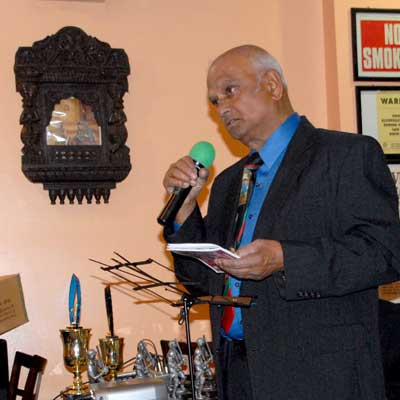By Sam Sooppersaud
That’s right, friends, I was kicked out of a recent meeting of the United States of America Cricket Umpires Association (USACUA). Adios! Goodbye! See you later! You’re Gone! Now, out you go! Despite the fact that I was there at the invitation of the president of the association, I was told that I have no right sitting in on the meeting. So, I peacefully left the meeting hall.

Well known journalist Sam Sooppersaud.
A few months ago, I contacted Mr. Danny Khan, to congratulate him on his election to the presidency of the organization. I told him that I believed his association is doing a great service to the game of cricket, and I have all confidence that it will continue to contribute towards the improvement of the game in New York and the USA. We chitchatted on various umpiring rules and rulings. I mentioned to him that I am concerned about an interpretation that some umpires are making with regards to a particular rule. The rule dealing with constraint on timing which an umpire must adhere to in changing his decision. We spoke of a few umpiring miscreants, as pointed out to me by various cricket fans. This article is not intended to discuss these matters, so I would desist from doing so.
About three weeks ago, I spoke to President Khan, again. He once more reminded me of the USACUA meeting, “coming up in a few weeks”. He reiterated his invite to me to attend the meeting. He told me that the Agenda for the meeting is already set, however, he would try his best to have me address the body of umpires, or he would raise my points of concern to them, while I am at the meeting.
On Saturday, August 19th, I saw the president of the USACUA at the Indo-Caribbean Federation (ICF) cricket game at Baisley Park, Queens, New York. He told me that their meeting would be held on that same afternoon at 6:00 P.M. at Singh’s Sporting Goods, and he hoped to see me there. I told him that I would be a “bit late” as I was involved in the ICF game.
I arrived at the meeting about half an hour after it had started. I went in to the hall and quietly took a seat at the rear. About fifteen minutes after I had taken a seat, a gentleman walked from the front of the room and asked to speak to me “outside”. We went outside the meeting hall. He identified himself as Sergeant of Arms of the umpires’ association. He told me “some umpires in front complained to the organization’s Secretary that I was not a financial member and that I should not be at the meeting”. I told him that I am a journalist and that the President invited me to the meeting, in that capacity. He said that the president admitted inviting me to the meeting. Yet, according to him, the Secretary insisted that I should be asked to leave the meeting. I left without any further discussion.
Why write this article? Reasons being that in my discussion with the newly elected president, Mr. Danny Khan, I was told “there would be changes”, and that, no one was going to “run over him and do whatever they want to do.” He mentioned several areas in which he would effect changes. He reassured me that he was going to “take charge.” Is this the way this president will take charge, by having the Secretary overruling his edict? As one of my friends put it, “he is just a paper tiger.”
I met President Khan today at a game. We talked about my expulsion from the meeting. He said he told “them” that he had invited me, but “you know”, and he just shrugged his shoulders. He told me that there’s a lot going on in the organization, including some financial irregularities and he intended to get to the bottom of it all. Come on now Mr. President. If you allowed yourself to be overruled by the Secretary on a simple matter, how then would you be able to “get to the bottom of it all”?
As president of an organization, when at meeting you are conducting, you are sitting as the Chairman. Your edict has weight. For instance, no one speaks unless the Chair recognizes him. Similarly, a request or edict from the Chair cannot, and should not be overruled by the Secretary, or anyone else. Mr. President of the USACUA, I would suggest that you consult Roberts Rules of Order. This literature will serve you well.